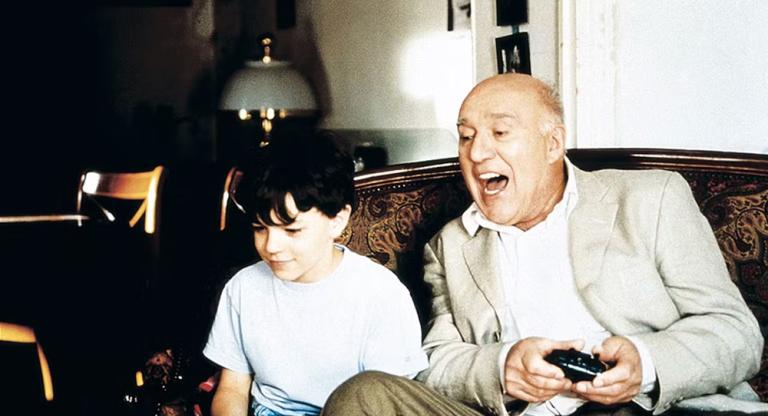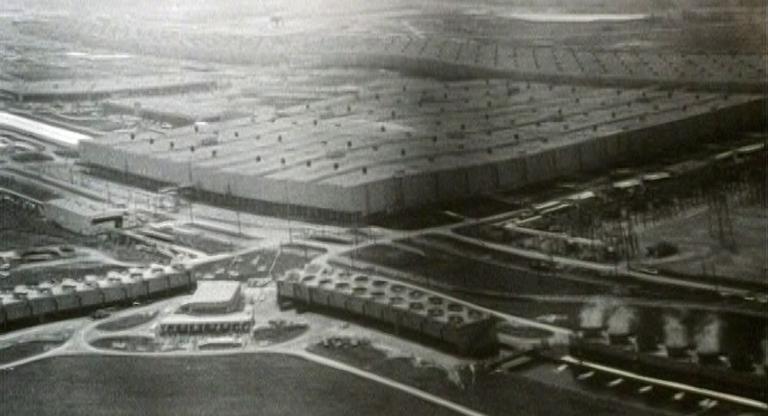It’s easy to see why the Kyiv Institute of Information, built in 1971, is locally nicknamed the “Flying Saucer.” Following Stalin’s death, the USSR’s disavowal of abstraction in design gave way to a renewed Soviet International Style, of which the Institute is a striking example. A domed, circular auditorium perches upon its gridded structure, an emblem of Space Age aspirations—as if it were an alien vessel alighting for a moment to beam up the knowledge of the books held therein, before jetting off again.
Oleksiy Radynski’s Infinity According to Florian (2022) introduces us to the saucer’s designer, Florian Yuriev, a sprightly figure even in his 90s. In addition to being an architect, he's a luthier, composer, filmmaker, painter, poet, conlanger, and color theorist—a total artist. Yuriev is an exponent of “color music,” an art form reflecting Soviet interests in a scientific integration of the arts, in which music is expressed through pure color, and vice versa. He intended the saucer to be a place for performances of color music, its walls painted in a rainbow scale of sonic frequencies, but its interior was instead adorned with figurative murals and used as a cinema and lecture hall. Though Yuriev’s synaesthetic proposal wasn’t realized, the film documents his fight to save the saucer from a far greater threat: its conversion into the entrance of a new shopping mall owned by the Russian retail mogul Vagif Aliyev.
Aliyev rarely appears in person, but his team assures Yuriev that the mall will not compromise the saucer’s integrity, despite failing to produce any design documents. Aliyev himself proposes that the saucer be repainted his favorite color; that he seems oblivious to how offensive this is to Yuriev’s sensibilities can be taken as a measure of his sincerity. Meanwhile, the mall’s construction proceeds at a brisk pace, and the protestations of Yuriev and other architects, despite garnering popular support, fail to halt it. Fast-tracking projects such as Aliyev’s has long been a tool of governmental corruption in Ukraine, and one senses that were it not for Radynski’s prying camera, most of the film’s meetings would have occurred entirely out of view of the public.
Yuriev’s battle could have made a compelling David and Goliath story by itself, but Radynski takes a more expansive approach, placing the saucer onto the uneven terrain of socialist and post-socialist modernity and memory politics. The film cuts from the arcing bows of a string quartet to the sweep of countless cranes through the air, passing over the churn of workers below, like a scene out of a warped version of Dziga Vertov’s Enthusiasm: The Symphony of Donbas (1931). Vertov’s first sound film glorified national developmentalism and the boundless productivity of the shock worker, and Radynski lays bare what this idealism has become: an endless cycle of exploitation driven by Russian money, another shopping center across from two others the next block over.
Water recurs as a motif, both signifying and subverting logics of accumulation. It floods impervious city streets even as concrete is poured nearby, further hardening the earth. In an incident possibly related to shoddy construction, scalding water swamps a parking garage, burning those inside. We learn that Aliyev’s mall will be named Ocean Mall, a self-aggrandizing nod to his previous Ocean Plaza. And excerpts from one of Yuriev’s unfinished films, Film Dedicated to Water and Trees, are shown. An eco-poem reminiscent of the work of Malena Szlam, it blends the forms of branches and waves into one holistic ripple of nature. Like the saucer, it’s a cosmic, utopian vision in opposition to the capitalist liquid modernity that threatens to destroy it.
Speaking to DocuDays UA, Radynski pointed out that Aliyev was arrested shortly after Russia’s invasion of Ukraine, which began not long after the events of the film. Aliyev, however, is hardly the saucer’s only enemy. The invasion has devastated the country’s historic architecture, not just through Russian bombs and missiles but also through the rushed passage of planning laws that have emboldened opportunistic developers under the pretense of postwar reconstruction. For now, the saucer stands. But the future it stands for has yet to come into being.
Infinity According to Florian shows tonight at the e-flux screening room followed by an in-person conversation with the filmmaker



